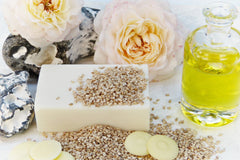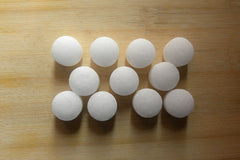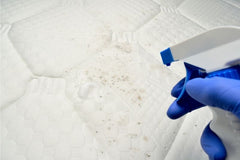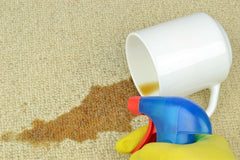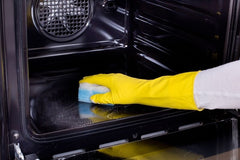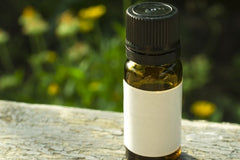How to Make the Best Natural Laundry Detergent at Home
Many of us take great pride in living a healthy lifestyle. We do so because we know that what we get out of life is directly correlated to what we put into our bodies. This often translates into placing an emphasis on the purchase of all-natural ingredients and beauty products.
But laundry detergent is one product that you could be overlooking in your quest to live a healthy life. More specifically, store-bought detergent can be full of harmful chemicals, which can cause many of the harmful side effects that you’ve been trying to avoid with your all-natural lifestyle.
The easiest way to correct this issue is by creating your own all-natural laundry detergent from home. Keep reading to learn why this is so beneficial and to find an easy recipe for it.
These products are the perfect way to get started with your natural laundry detergent creation process:
- Lavender Essential Oil for a detergent with a calming natural scent
- Liquid Castile Soap for an all-natural way to power your detergent
- Positively Citrus Essential Oil for an all-natural detergent with an uplifting scent
What should I be avoiding in store-bought laundry detergents?
Commercial laundry detergent is packed with harsh chemicals. When you use these chemicals to wash your clothes, it’s unavoidable that many of them will find their way into your skin. That’s why your best strategy is to avoid the following store-bought laundry detergent ingredients all together.
1.4 Dioxane
1.4 Dioxane can cause both short and long-term damage. In the short term, it may irritate both your eyes and nose. Over the long term, the Center for Disease Control and Prevention says that the chemical can cause cancer and do serious damage to the brain, central nervous system, kidneys, and liver.
Nonylphenol Ethoxylate (NPE)
Researchers have found that NPE mimics estrogen so as to disrupt the normal functioning of the endocrine system. Given the importance of this system, NPE is another harmful chemical found in store-bought detergent that you should avoid.
Sodium Lauryl Sulfate
Sodium lauryl sulfate has been linked to a number of cancers. It’s also been shown to cause organ toxicity, skin irritation, and to disrupt the endocrine system. It should be avoided as often as possible when washing your clothes.
Formaldehyde
You might not expect to see this chemical (which is used to preserve dead bodies) on a list related to store-bought laundry detergent. But, indeed, formaldehyde is used in many commercially-available detergents. This is despite the fact that the CDC says that even breathing or smelling a small amount of the chemical can increase your risk of cancer
Chlorine Bleach
Bleach is commonly used but that doesn’t mean that it’s good for your health. To start, it’s a serious irritant to the skin and lungs. Chlorine bleach can also cause blindness, pulmonary edema, and even respiratory failure. That doesn’t sound like the kind of ingredient that you want to be using on your clothes.
Other Ingredients to Avoid
The five ingredients listed above are some of the most harmful laundry detergent chemicals. But they’re not the only ones. Here are a few more that you should avoid:
- Phosphates
- Ammonium sulfate
- Optical brighteners / UV brighteners
- Ammonium quaternary sanitizers
- Fragrances
- Dyes
- Benzyl acetate
- Dichlorobenzene
Benefits of natural laundry detergent
The chief benefit of natural laundry detergent is that using it enables you to stay away from all of the harsh and toxic ingredients listed in the previous section. But that’s certainly not the only reason that you should consider switching to a natural alternative.
Better for the Earth
When harmful chemicals are used to create products like laundry detergents, those chemicals almost spill out in various ways to impact our environment. For example, phosphates, which are commonly used in laundry detergents, have been shown to poison fish and their environments.
When you use a natural detergent, you reduce the demand for detergents that are made with ingredients like phosphate that hurt the environment.
Better for Your Clothes
Natural laundry detergents can also help your clothes look better and last longer. They do so by reducing the wear and tear that your clothes’ fibers go through while being washed.
Better for Your Nose
Commercial detergents often have an overpowering smell that can be quite unpleasant and even lead to headaches. Natural detergents replace this harsh chemical smell with a pleasing alternative.
Creating your own laundry detergent also empowers you to select the scent that you like most. For example, if you love lavender, add a splash of lavender essential oil to your detergent and your nose will be happy all day long.
Better for Your Washing Machine
Natural detergents may even help to clean out your washing machine. That means using one could be an easy way to tackle two of your to-do list items at the same time.
Better for Your Wallet
Commercially-available laundry detergents can be awfully expensive -- especially if you use them often. Creating your own homemade alternative can be a much more cost-effective way to keep your clothes clean, as the ingredients that you purchase to do so will allow you to make enough detergent to last your household for months.
The best ingredients you need for the best natural laundry detergent
Creating your own natural laundry detergent at home is actually a fairly straightforward process. The first step is to gather the ingredients that you’ll need to create your detergent. Here’s what you should have on hand before getting started:
- 1 cup of baking soda;
- 1/3 cup of sea salt;
- 2 1/2 cups of warm water;
- 1 cup of liquid castile soap;
- 15-20 drops of your favorite essential oil;
- 1-gallon jug;
- Water to fill a gallon jug.
Check out our Natural Beauty Wellness Kit if you’re looking for an easy way to grab the tools and ingredients you need to create your own natural wellness products at home.
How to make your own natural laundry detergent
After gathering your ingredients, follow these steps to make your detergent:
- Add the baking soda, sea salt, and water to the jug.
- Shake the jug so that the baking soda and sea salt dissolves into the water.
- Add the castile soap to the jug, along with 15-20 drops of your favorite essential oil.
- Mix the jug gently by swirling it around with your hands.
- Transfer the mixture to a storage container (or just leave it in the jug) and use it as needed.
How to use a natural detergent
Some people wonder whether there are any special rules that must be followed after making the switch to a natural detergent. But there really aren’t any. You can use whatever natural detergent that you create virtually the same way that you would use a store-bought alternative.
If you’ve followed the recipe that we’ve shown above, then the amount of detergent that you’ll use per load will vary based on two factors. The first is whether you have a normal washing machine or a high-efficiency one.
High-efficiency machines need only about 1/4 cup of our natural detergent per regular load. Normal washing machines require about a half of a cup per regular-sized load.
If you plan on washing more clothes than normal, then you’ll need to increase the amount of detergent that you use. For oversized loads, we recommend using between 1/2 and 1 cup depending on the efficiency of your washing machine.
How long does your natural detergent last?
Natural laundry detergent doesn’t include the same chemical preservatives that are utilized in commercial products. But that doesn’t mean it’ll spoil overnight.
You can expect your natural detergent to last for about six months. That should be plenty of time to use what you’ve created.
What essential oils are best for natural laundry detergent?
One of the benefits of making your own laundry detergent is that you get to customize its scent with your favorite essential oils. But some oils work better than others. For a laundry application, you want to prioritize using essential oils that offer antimicrobial, antifungal, and antibacterial properties.
Here are some of the most commonly used essential oils for laundry detergent and why you might want to consider using them yourself.
Citrus Essential Oils
Citrus oils make an excellent addition to any homemade laundry detergent recipe. They’re wonderful at cleaning dirt and grime, while also providing a deodorizing quality and a fresh, uplifting scent. The best citrus essential oils for laundry are:
Tea Tree
Tea tree essential oil is a powerful fighter of mold and mildew. Its antifungal properties make it a good choice for those times when you need to rewash clothes that have sat in the laundry for too long and developed a moldy, mildewy smell.
Lavender and Chamomile
Lavender and chamomile essential oils are naturally calming and relaxing. That makes them a great option for laundry detergent that you plan on using to wash your bedding. Doing so could even help you get a better night’s sleep.




